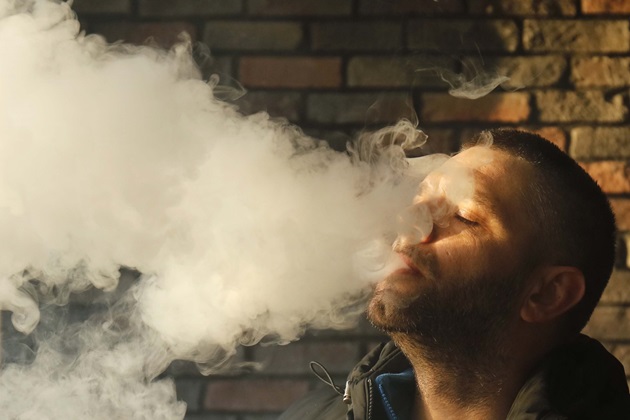Activate speaks to a member affected...
J provides primary care to over 500 prisoners. Due to the increasing problem with the use of spice in prisons, caring for his patients often means putting his own health at risk.
Spice is a psychoactive substance which has dangerous effects on both the person smoking it and anyone who inhales the fumes second-hand.
On a quiet day, J and his team are usually called out to at least one medical emergency that is a result of a prisoner smoking spice. Recently, they responded to over 50 in one week.
“You can tell if it’s spice because it smells like burning paper,” explains J, who has asked to remain anonymous. “Usually when we get there the smoke hasn’t cleared. It’s not just in the cells; the ceilings are low and there aren’t many windows in the corridor so the smoke lingers in the air.
“Walking back after attending to a patient, I’ve suddenly felt dizzy, nauseous – it’s almost like the world has zoomed out. It’s really bizarre.”
Similar accounts have been given by nurses and health care assistants working in prisons across the UK, including some RCN members. They have reported feeling nauseous, light-headed and some have even fallen unconscious. In at least one case, not at J’s prison, a nurse has been taken to A&E in an ambulance after inhaling spice.
Walking back after attending to a patient, I’ve suddenly felt dizzy, nauseous – it’s almost like the world has zoomed out
But it’s not just the physical effects of feeling unwell that are the problem; if you inhale spice, technically you’re under the influence of drugs meaning you’re not allowed to drive and under the NMC code of conduct, you can’t administer medication.
J says: “There was a day when three people on my team couldn’t give medication because it wouldn’t have been safe. Not only is our health being put at risk, but we can’t do our job properly and other people are missing out on care.
“I’ve sat in my car in the carpark for 50 minutes after work so I feel confident enough to drive. We’re all worried about driving in case it’s not safe or we get stopped and it shows in our system.”
The effects on the person who has actually smoked the drug are even more alarming.
J describes some typical symptoms: “Dilated pupils, a rapid heartbeat, state of collapse, and disorientation are all common effects. A lot of people become violent and aggressive. Prolific use of the drug can lead to psychosis.
“A normal heartbeat is 60 to 90 beats per minute but after smoking spice, we’ve seen people with heartbeats of 140 to 180 beats per minute. A lot of the prisoners here don’t have the physical reserves to sustain that rate so there is a real risk they could die which is frightening.”
The other frightening thing is that everyone reacts differently to spice so J and his team never know what they will be dealing with when they’re called out to an emergency.
“The situation can change so quickly,” J says. “Someone could be passed out and need oxygen and then the next second, they’re jumping up and down, getting violent or laughing hysterically.”
Someone could be passed out and need oxygen and then the next second, they’re jumping up and down, getting violent or laughing hysterically
The use of psychoactive substances, like spice, is so widespread because they are cheap and easy to smuggle in. Often spice is sprayed on to letters which are then ripped up and smoked.
“It’s difficult to detect,” says J. “And there could be other dangerous substances too. Recently there was a batch of spice with traces of cockroach killer in it so we really have no idea what harmful chemicals we’re inhaling as well as spice.”
Despite the health risks, J says he and his colleagues feel “duty bound” to provide care: “At the time your overwhelming concern is for the patient.
“What would happen if someone died because I refused to go in? It’s a horrible situation to be in. The reality is we’re looking out for our registration not our health.
“If the person can walk then we do ask them to come out of the cell. If they’re unconscious, we’ve started asking the prison officers to help drag people out in to the corridor. The prison officers are in the same boat as us; it’s their job to look after the prisoners too.”
Seeking action
The RCN has been calling for the prison service to take urgent action to better protect nursing staff and is meeting with the Chief Executive of HM Prison and Probation Service (HMPSS) and senior officials at NHS England to discuss what can be done.
Brian Morton, RCN National Officer, says: “We need clearer guidance from the prison service.
“This is a huge health and safety risk and although prisons aren’t usually the direct employer of health care professionals, they still have a duty to make sure the working environment is safe.
“Current guidance suggests nursing staff are expected to provide care for prisoners even if that means entering a cell which is filled with smoke. This is unacceptable.”
Spice, and other psychoactive substances, are relatively new drugs and Brian points out that the guidance appears to have been written with second-hand cigarette smoke in mind too.
“It doesn’t highlight how extreme the problem with spice and other psychoactive substances is,” says Brian. “We need the prison service to work with health care staff and their employers to update the guidance and tackle this problem.”
Do not put yourself in danger
Until clearer policies and procedures are put in place, the advice to nursing staff is not to put themselves in danger.
Brian says: “We know it’s difficult, especially in an emergency but members need to protect their own safety and the safety of their colleagues first.
“RCN safety reps should be advising members to familiarise themselves with their employer’s health and safety policies and to raise this issue with their employers so those policies can be reviewed.
“Prison services and the employers of prison health care staff should be carrying out risk assessments and communicating emergency procedures to all staff. If a member has concerns about this, they should raise this with their manager.”
It’s also important to tell members to document all exposures in their local incident reporting systems.
“If someone is worried about driving home following an exposure then they should discuss this with their manager,” adds Brian. “We would expect their manager to look at alternative ways to support that person to get home, especially in rural areas or out of hours.”
You could help
Situations like this highlight the need for RCN safety reps and illustrate the vital role they play in the workplace.
The RCN provides high quality training and support for members who want to become safety reps giving you the tools to make improvements in your workplace.
If you work in a prison, or you work for an organisation which provides prison health care, and you want to help address this issue, find out how to become an RCN rep or take a look at the role of RCN safety reps for more information.








